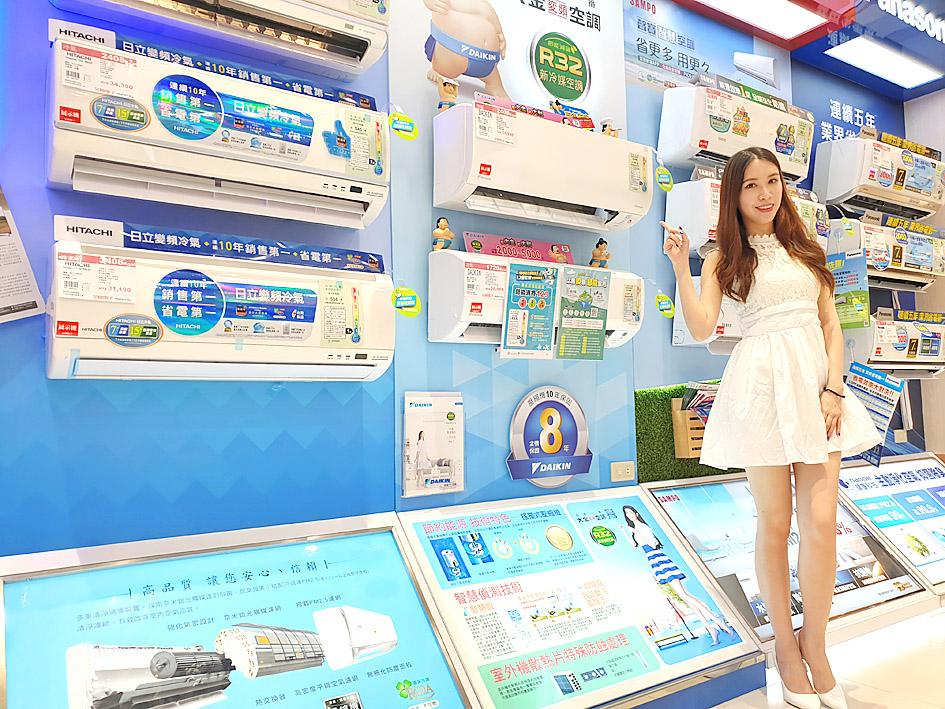A tax incentive package to encourage purchases of energy-efficient home appliances that is set to expire on June 14 would be extended by an additional two years, the Ministry of Finance (MOF) said yesterday.
The ministry has proposed a draft amendment to the Commodity Tax Act (貨物稅條例) that would extend the tax breaks on select energy-saving appliances until June 14, 2023.
Article 11-1 of the act stipulates that a commodity tax cut of up to NT$2,000 (US$70.58) would be given for purchases of new refrigerators, air conditioners or dehumidifiers that meet either Level 1 or 2 energy-saving standard specified under the Bureau of Energy’s energy-efficiency rating program from June 15, 2019, to June 14 this year.

Photo: Wu Pei-hua, Taipei Times
The incentive has contributed greatly to energy savings and carbon emissions reduction, while reducing electricity bills for consumers, the ministry said.
The draft amendment is subject to a 20-day public comment period starting yesterday, it added.
Ministry of Economic Affairs statistics showed that 10 years or older air conditioners and refrigerators account for 42.72 percent of those used in homes in Taiwan, prompting the finance ministry to propose extending the incentive.
As of the end of last year, 2.657 million applications for tax deductions had been filed, which translates into NT$4.47 billion in tax rebates, finance ministry statistics showed.

South Korea’s equity benchmark yesterday crossed a new milestone just a month after surpassing the once-unthinkable 5,000 mark as surging global memory demand powers the country’s biggest chipmakers. The KOSPI advanced as much as 2.6 percent to a record 6,123, with Samsung Electronics Co and SK Hynix Inc each gaining more than 2 percent. With the benchmark now up 45 percent this year, South Korea’s stock market capitalization has also moved past France’s, following last month’s overtaking of Germany’s. Long overlooked by foreign funds, despite being undervalued, South Korean stocks have now emerged as clear winners in the global market. The so-called “artificial intelligence

Chinese artificial intelligence (AI) start-up DeepSeek’s (深度求索) latest AI model, set to be released as soon as next week, was trained on Nvidia Corp’s most advanced AI chip, the Blackwell, a senior official of US President Donald Trump’s administration said on Monday, in what could represent a violation of US export controls. The US believes DeepSeek will remove the technical indicators that might reveal its use of American AI chips, the official said, adding that the Blackwells are likely clustered at its data center in Inner Mongolia, an autonomous region of China. The person declined to say how the US government received

‘SEISMIC SHIFT’: The researcher forecast there would be about 1.1 billion mobile shipments this year, down from 1.26 billion the prior year and erasing years of gains The global smartphone market is expected to contract 12.9 percent this year due to the unprecedented memorychip shortage, marking “a crisis like no other,” researcher International Data Corp (IDC) said. The new forecast, a dramatic revision down from earlier estimates, gives the latest accounting of the ongoing memory crunch that is affecting every corner of the electronics industry. The demand for advanced memory to power artificial intelligence (AI) tasks has drained global supply until well into next year and jeopardizes the business model of many smartphone makers. IDC forecast about 1.1 billion mobile shipments this year, down from 1.26 billion the prior

FORTUNES REVERSED: The new 15 percent levies left countries with a 10 percent tariff worse off and stripped away the advantage of those with a 15 percent rate In a swift reversal of fortunes, countries that had been hardest hit by US President Donald Trump’s tariffs have emerged as the biggest winners from the US Supreme Court’s decision to strike down his emergency levies. China, India and Brazil are among those now seeing lower tariff rates for shipments to the US after the court ruled Trump’s use of the International Emergency Economic Powers Act to impose duties was illegal. While Trump subsequently announced plans for a 15 percent global rate, Bloomberg Economics said that would mean an average effective tariff rate of about 12 percent — the lowest since